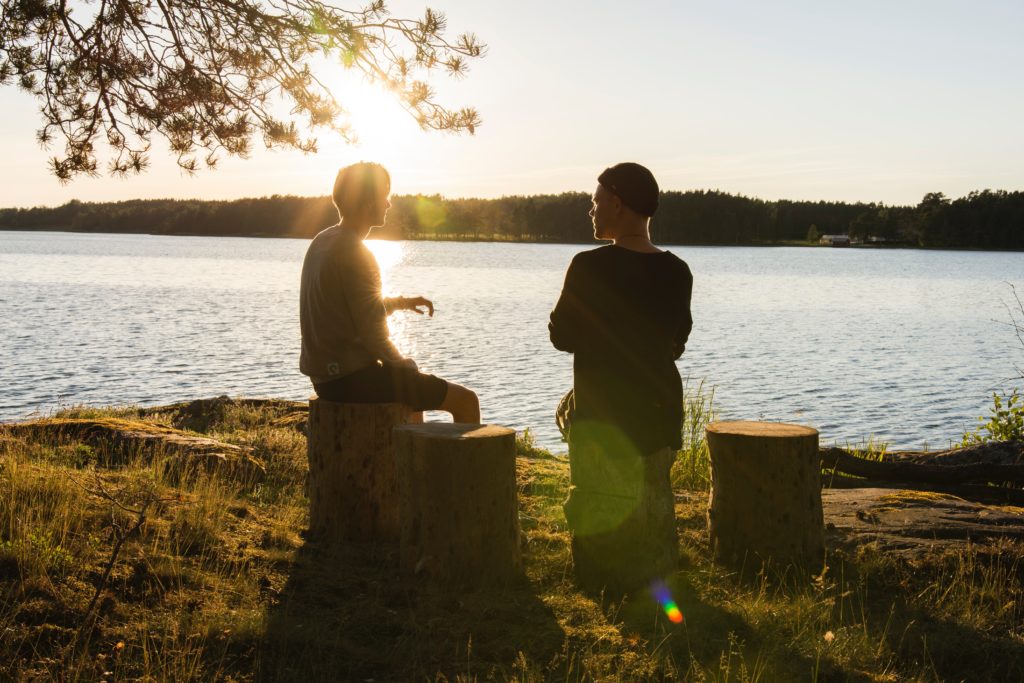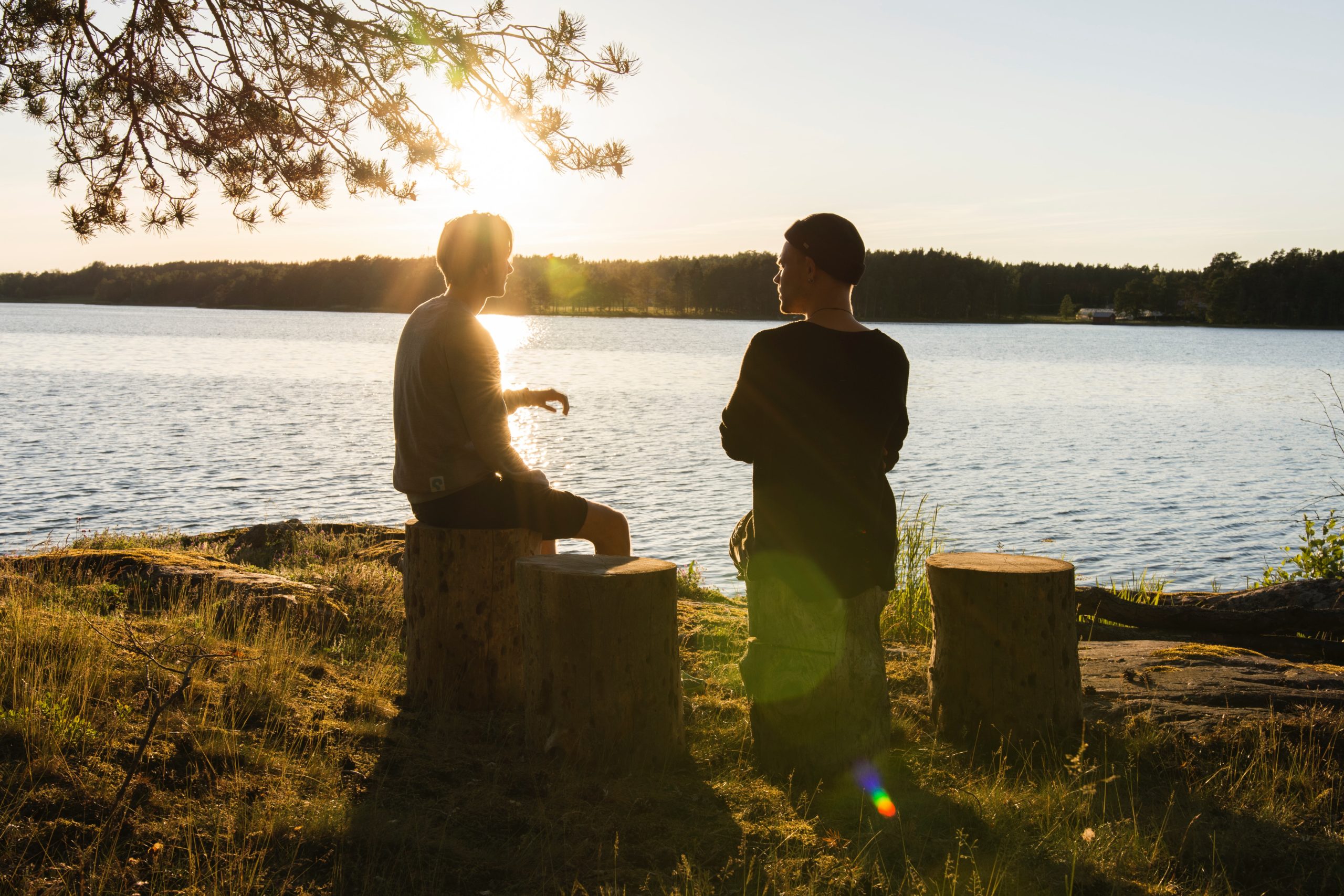As I launch a newsletter, here’s why I chose the title Listening While White and why I hope you’ll join me.

Listen. Can you hear it? Beyond the rumble of the dishwasher and the mewing cat and the whirring traffic and that one bird outside incessantly chirping that melody you’ve been meaning to look up, can you hear it?
Out there are 7.7 billion people, and in each one lives a story. Every single one has some story they would give the world like a wrapped gift held with outstretched arms if somebody would just look them in the eyes, say thank you, and receive it. And in that giving and receiving we could find something of the very deepest good meaning in life.
A while back I was sitting on my front porch on a summer afternoon with a pastor friend when he gave me one such gift. “If I were to write a book,” he said, “I would call it Listening While White.” We’d been talking about how it came to be that he, a Canadian-American white man now in his sixties in a mostly white church and a mostly white city, had come to be spending every spare Sunday worshipping at a mostly Black church. And he told how to his utter flabbergastment at the undeservedness of it he had found himself not rejected there as the history of racial oppression might predict, not even just menially put up with, but in one of humanity’s most mysterious acts of grace, embraced as a friend. He said he doesn’t claim to be any kind of perfect example of figuring out how to speak and push and make this world a less oppressive place, but he does know that a lot of what people need comes back to listening.
We need listening across divisions of privilege, class, ethnicity and race. We need to listen across history, and we need to listen in ways that bring healing for both the listener and speaker. We need to hear the unspoken as well as the spoken. And we need to be ready to listen to the Spirit of God and the spirit in a sister or brother.
A while later I went back to that pastor, Mike Winnowski, and told him that I was planning to start a newsletter with stories and lessons for folks trying to build better communities. After a long time mulling over titles, I’d kept coming back to his phrase, Listening While White. He said I was welcome to use his idea, which is the sort of generous thing he often does.
Why “While White?”
In case you haven’t noticed, I am white. I am also female, cisgender, straight, temporarily able-bodied, a mom and a wife, caretaking Wisconsin land in the traditional homeland of the Ho-Chunk nation. And I’m also committed to following the ways of Jesus. These facets of my identity don’t make up the sum of all I am, but they do shape my perceptions of the world and the ways the world perceives me.
When each of us takes an honest look
at how we uniquely fit into society,
that’s a starting point for love.
An anthropologist named David Graeber once described a terrible experience of trying to convince a bank to allow his elderly home-bound mother to complete some vitally important bureaucratic paperwork. Bank officials kept refusing to care one bit about their situation. Eventually it dawned on him that they simply didn’t have to care. He summed it up with this observation: “While those on the bottom of a social ladder spend a great deal of time imagining the perspectives of, and genuinely caring about, those on the top, it almost never happens the other way around.” Listening is a necessity of survival for those with lesser privilege. For those with more privilege, listening takes intentionality. It’s a way of stopping in your tracks to say, “I’m gonna try for a more just world today.” I want to learn from both kinds of listening, but I know often for me right now it’s going to be the second kind.
If you’re into learning how to walk humbly in areas of injustice, this newsletter is for you whether or not you identify as white or share any of my other my social markers. If you’re not white, you might feel you get plenty of listening to white people already in every media and social interaction, and I respect that. The difference here is I’ll be open about what is and isn’t specific to being white, because I believe that when each of us learns to take an honest look at how we uniquely fit into society, we’re better able to know ourselves and respect other people, and that’s a starting point for love.
As you probably noticed, the phrase “verb + while + racial group” is also intentional. My friend Melissa just co-authored a book called Mentoring While White. She and her co-authors said they chose that title “in acknowledgement of those who have lost their lives driving while Black, jogging while Black, sleeping while Black, yelling while Black, parking while Black, babysitting while Black, sitting in a van while Black, selling CDs while Black, opening the door while Black, walking and wearing a hoodie at night while Black, holding a toy gun while Black, being in a dark stairwell while Black, holding a cell phone while Black, shopping while Black, and eating ice cream while Black” (Butler, Frainde-Wu, and Winchell 2022:4). If you’ve read this far, you probably share my hope that those “while Black” experiences will one day end differently.
In my research I listen to a lot of people talking about what can be done to work toward that day. Recently a woman of color was telling me about her hopes for racial justice, and she said this: “Frankly, I don’t feel like anybody’s ever cared what I had to say.” She said she wished “white Christians could start to learn how to not center themselves in the story.” She hoped more would see that “they have something to be taught or learned elsewhere from unexpected places where they have traditionally been suspicious.” Listening while white isn’t all that needs to be done, but it is one starting point.
Listening isn’t all that needs to be done,
but it is one starting point.
Why “Listening?”
When people ask me what it means to be a Cultural Anthropologist, sometimes I say, “I’m a professional listener.” Anthropology is an academic discipline built around the idea that by listening with ordinary people in ordinary settings, we can learn things we wouldn’t learn any other way. Anthropologists will be the first to tell you that we have made a lot of mistakes and done a lot of harm doing this badly. But anthropologists have also learned a good deal about how to listen in ways that produce respect, mutual transformation, healing, and social change. I’m grateful for what I’ve learned from this discipline, and I love helping people apply the skills and ideas from anthropology to whatever your own vocation includes.
I’ll also mention that by “listening,” I’m not just speaking literally about the things some people’s ears do. The kind of listening I’m writing about also includes a lot of watching, and coming alongside, and paying attention to our own feelings and those of others. An elderly relative of mine who is deaf, who often sits quietly on the fringes of family gatherings soaking in all that is happening with a warm caring smile, is perhaps one of the best listeners I’ve known.
The point of this kind of listening is not to collect stories like oddities to perch on museum shelves or dazzle some friends. Listening doesn’t mean you agree or condone. Listeners learn to deal with both similarities and differences, each with its own challenges. The kind of listening we’re after is what Story Corps founder David Isay refers to when he says “listening is an act of love.”
We listen because stories have a wider context. As Chimamanda Ngozi Adichie famously reminded us, no one is a single story. In listening, we find trends and particularities so we we can fit our own stories into bigger stories. We can learn how culture and society work, and maybe even something about how God works. We expand our vision to see all of us together becoming something bigger than any single one of us. The more we listen, the better we can foster diverse transformative communities where everybody flourishes.
I hope you’ll join us.
P.S. If you want to sneak peek before signing up, you can see some of my latest newsletters here.

